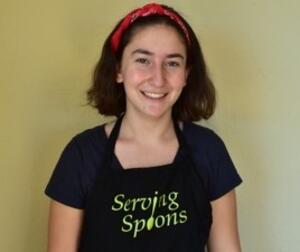Double-Bound
I am the President of a nonprofit, Serving Spoons, that prepares and delivers healthy, home-cooked meals to families in need. I accepted this leadership position nearly five years ago, and though I expected to encounter challenges due to my age, I felt confident I could convince the other industry professionals to take me seriously if I demonstrated maturity, responsibility, and commitment to my organization. Yet one of the greatest challenges, as I soon discovered, wasn’t my mere fourteen years, but rather my identity as a female.
I have many responsibilities as the President of Serving Spoons, including managing the budget, coordinating volunteers, and delivering meals to recipient families. I also have to raise money, as we are funded entirely by grants and donations. My capability to perform these tasks and successfully lead the organization have at times been questioned due to my gender.
This challenge is a quintessential representation of what feminist theory has dubbed the women’s “double bind,” the idea that women are held to two unachievable standards; they are expected to be personable and nice, as gender stereotypes dictate, but are also subject to the prejudices ingrained in our culture that equate “leader” with “masculine.” This is only exacerbated by the fact that Serving Spoons centers around food and cooking—an activity that is historically linked to sexist notions of women as homemakers. I’m thus continually regarded as either too assertive for my gender, or too meek for my position.
Looking at the food industry, it appears that my experience is a common one. You wouldn’t think that gender discrimination would be such a big issue in the kitchen—after all, women have long been told that’s where they “belong.” At first glance, it appears that women do well in this area, occupying 55% of food preparation and serving-related occupations. But a closer examination of this data reveals that, despite this majority in the industry as a whole, women hold only 22% of the chef or head cook positions. What’s more, the pay gap in food service is the second-highest in the entire country, with women making 28% less than men in the same position. It appears that, even in jobs traditionally regarded as “women’s work,” women’s efforts are continually undervalued.
So where does that leave me? As I prepare to go to college next year, I’m confronted with a startling reality. Not only will I have to leave Serving Spoons behind, but my ability to get involved with another organization that combines my passions for food and service work may be limited by gender-bias. I love to cook, could even see myself working in a professional kitchen one day, but how likely is it that I would ever be an executive chef? And even if I was, would I be paid the same as my male counter-parts? It’s a depressing forecast, but one that I hope to change with my activism and that of my fellow feminist comrades. As I’m reminded every day when working with Serving Spoons, personal initiative can create great and lasting change.
This piece was written as part of JWA’s Rising Voices Fellowship.








Inspiring!! Making a difference one meal at a time!
Yes queen!